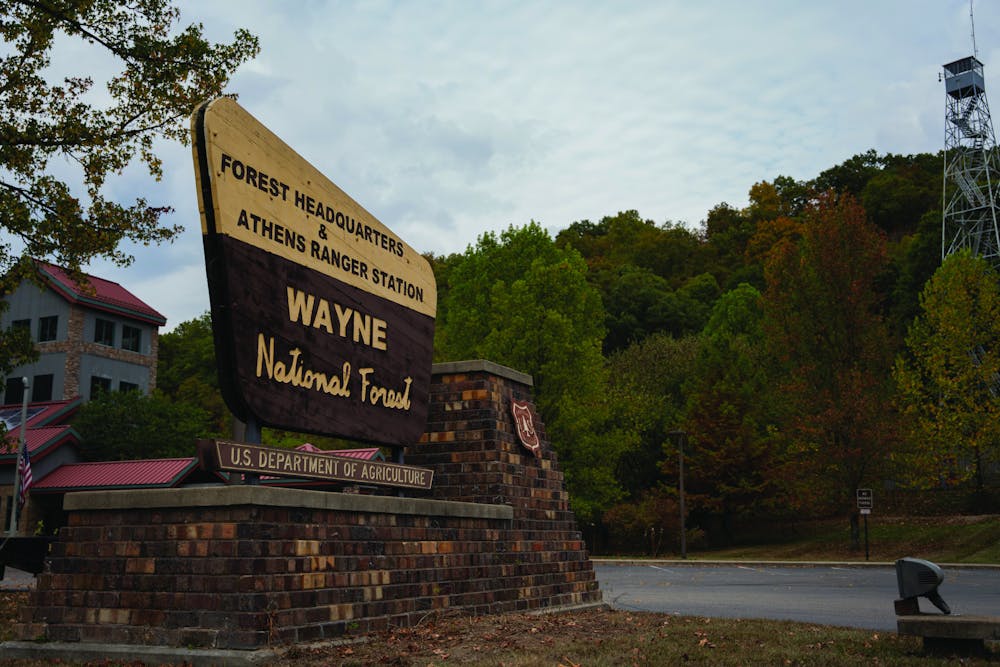Like much of the U.S., Southeast Ohio has a rich history rooted in Indigenous culture. Looking at Ohio University specifically, the Athens campus occupies the traditional homelands of the Shawnee people, the Wahzhazhe (Osage) as well as the Adena and Hopewell prior to that.
However, according to Advance Native Political Leadership, Indigenous people only represent 2.1% of the population. According to OU’s Diversity Dashboard, there are 22 currently enrolled students who identify as American Indian or Alaska Native at OU.
It was for this reason three underclassmen made it their mission to start an organization that aims to provide an opportunity for Indigenous and non-Indigenous students to learn more about Native American culture, traditions and history with the Ohio University Indigenous Circle.
William Kilbane, a sophomore studying biological sciences, is the president of the club. He said he founded the club to make more connections with fellow Indigenous students. Kilbane is Navajo and grew up in California. After coming to OU, he encountered a lack of diversity on campus.
“I moved to Ohio about three years ago, and I was just overwhelmed by the amount of whiteness that's here,” Kilbane said. “Then I came to OU and me and him were the only Indigenous people I knew.”
The other student he referred to is Enzo Lewis-Baranyai, a sophomore studying biological sciences and the vice president of Indigenous Circle. The two are Rankin scholars, a scholarship offered to incoming Native American students.
Levi-Joseph Facun, a freshman studying geography, is a member of the organization and felt similarly to Kilbane regarding the makeup of the city and campus. He is Otomi, a tribe native to central Mexico.
“I’ve lived in a lot of places, but I’ve lived in the Athens area for almost eight years, and pretty much everybody is white,” he said. “I just joined because I thought it would be cool to be around other Indigenous people because that’s not really been an opportunity I’ve ever had.”
The club is still very new, with no official programming setup as of right now. However, the club said they want to focus their efforts toward hosting events for Native American Heritage Month, which is in November.
Some of these events include hosting a powwow and implementing a teepee somewhere in Athens, according to Kilbane.
The club is open to everyone as long as they are interested in learning and celebrating the cultures of different Native American tribes. Lewis-Baranyai has Blackfoot heritage and advocated for an organization for all.
“Even if you’re not Native American, it is like some of the oldest cultures out there,” Lewis-Baranyai said. “I feel like there’s so much you could take away and learn from it in general.”
The pair said they also want the club to serve as an opportunity for themselves to connect more with their heritage.
“A lot of us are pretty displaced from our cultures,” Kilbane said. “I have not been on my reservation in three years since I moved here. So it’s kind of like I’m trying to recreate that feeling.”
Similarly to Kilbane, Facun said he joined because he wanted to feel in touch with his heritage.
“I’ve never been on a live reservation; it’s in Mexico, and I have never been to Mexico, so I’m very much displaced from the culture,” Facun said. “I don’t have much experience at all with the Otomoi culture, so that’s something I would want to change in the future. I think through this club … I could get more of that.”
Already, Kilbane said they have seen the benefits of starting the club. He said they have had people reaching out wanting to join and collaborate.
“When I say we want a voice, we’ve gotten a voice since we made this club,” Kilbane said.
Regarding the future, Indigenous Circle has high hopes for what the organization could look like.
“By the time I’m a senior, so in two years, we can definitely grow it to where it’s self-sustaining,” Lewis-Baranyai said.
He discussed not only wanting to have a long-lasting support system for Indigenous students, but also having an organization that acknowledges the longstanding history of Indigenous people in the region.
“I think it would be good to always have the support system,” Lewis-Baranyai said. “Also just to have that recognition on campus because historically this area has Native American (roots) so it’s historically a part of Athens as well.”






